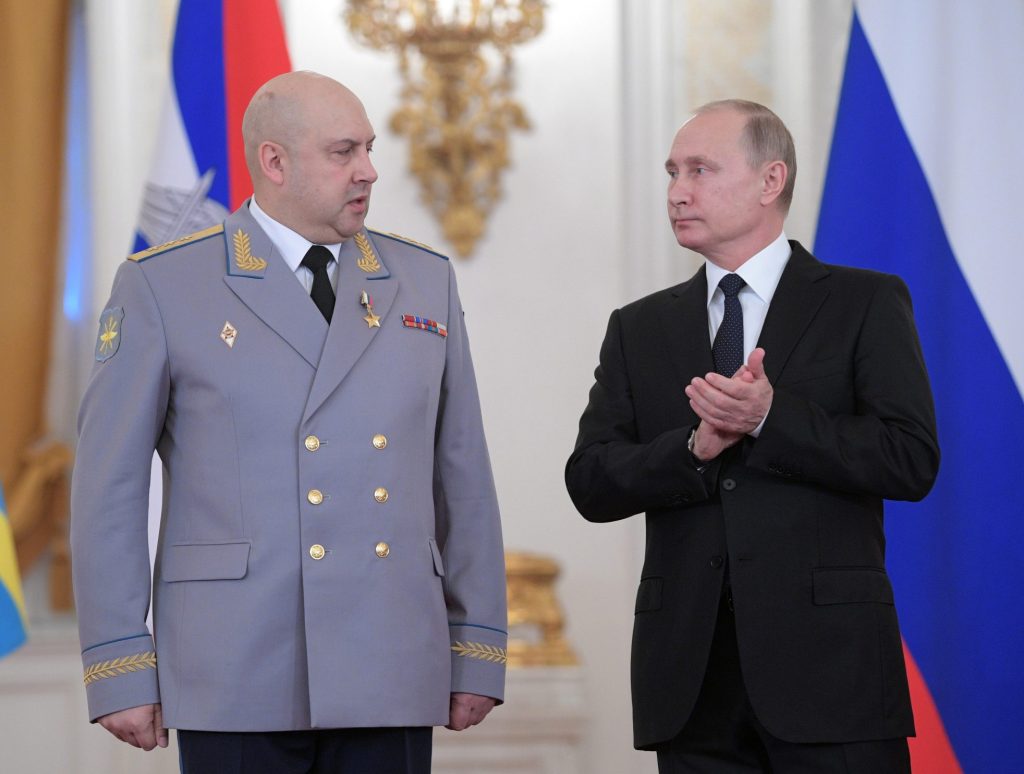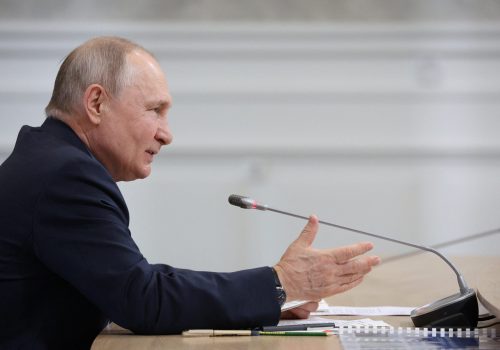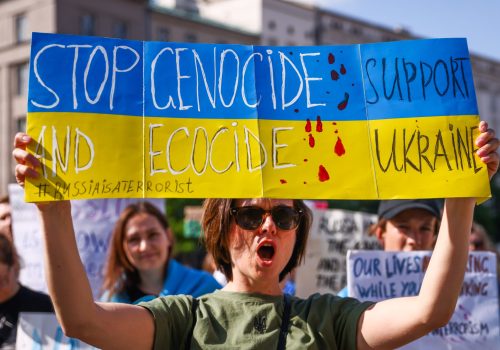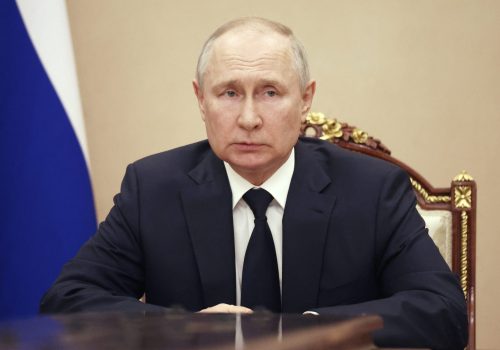The Wagner mutiny in late June was a brief affair, but it is casting a long shadow over Putin’s Russia. In less than forty-eight hours, Wagner chief Yevgeniy Prigozhin and his troops succeeded in shattering the carefully constructed myth of Putin the strongman, while exposing the weakness at the heart of his regime. Although the immediate danger has passed, many now believe it is only a matter of time before the Russian dictator faces new threats to his authority. However, with all genuine political opposition inside Russia long since eliminated, the real question is: Who could realistically challenge Putin?
It is easy to understand why many observers believe Putin is currently weaker than at any time in his entire twenty-three-year reign. During their short-lived uprising, Wagner forces managed to capture one of Russia’s largest cities, Rostov-on-Don, without a fight. A column of Wagner troops then advanced across Russia virtually unopposed, coming to within 200 kilometers of Moscow before choosing to turn back. As the drama unfolded, neither the Russian establishment nor the public rallied around Putin, who was conspicuously absent. Instead, there were widespread reports of panic across the country, while crowds in Rostov actively cheered Wagner troops.
The exact nature of the deal that ended the mutiny remains unclear, but the few details that are publicly known have done little to repair the damage done to Putin’s reputation. Neither Wagner leader Prigozhin nor his soldiers have been arrested or otherwise punished for their revolt, despite the fact that they downed a number of Russian aircraft and killed Russian servicemen. Instead, Kremlin spokesman Dmitry Peskov has recently confirmed that Putin personally met with Prigozhin and dozens of other Wagner commanders just five days after the mutiny. Remarkably, Peskov revealed that Putin spoke about future job opportunities during his three-hour discussion with the leaders of the mutiny.
Putin’s apparent readiness to compromise has created the impression of a vulnerable dictator who lacks both the support and the military strength to follow through on his earlier vow to “crush” the mutiny. This has led to widespread speculation that the Wagner revolt may now inspire other anti-regime uprisings. In a 9 July interview with ABC News, Ukrainian President Volodymyr Zelenskyy suggested the Wagner mutiny might serve as a catalyst for further domestic destabilization in Russia. “There is a signal that there might be another mutiny in Russia, a revolution,” he noted. “More than that, there are many people who might support such a mutiny.”
Stay updated
As the world watches the Russian invasion of Ukraine unfold, UkraineAlert delivers the best Atlantic Council expert insight and analysis on Ukraine twice a week directly to your inbox.
Who could lead the next uprising? One obvious candidate is Chechen leader Ramzan Kadyrov. Like Wagner chief Prigozhin, Kadyrov enjoys a high degree of autonomy and has large numbers of troops under his personal command. With the Kremlin’s blessing, he rules Chechnya as his personal fiefdom. He also has a long history of clashes with Russian governmental institutions and has joined Prigozhin in criticizing the conduct of the war in Ukraine. However, Kadyrov was ultimately one of the few prominent figures to publicly back Putin during the Wagner mutiny, and also sent Chechen fighters to Rostov-on-Don.
Kadyrov’s eagerness to support Putin was telling. While he might have the manpower and independence to take action challenging Putin’s power, it is not clear that he sees any advantage in doing so. Secure in his autonomy, Kadyrov may have calculated that it would be more beneficial to preserve his place in the current system than to back a risky rebellion with uncertain prospects.
Eurasia Center events

A more substantial challenge to the Putin regime may yet emerge from within the ranks of Russia’s increasingly disgruntled military. The Kremlin’s meek response to the Wagner mutiny has exacerbated already declining morale among Russian troops and commanders currently serving in Ukraine.
For more than half a year, a steady stream of video addresses posted to social media by Russian soldiers complaining of suicidal orders and catastrophic losses have pointed to growing demoralization. Meanwhile, recent developments indicate that dissatisfaction with the Kremlin has now reached the level of senior commanders. A July 13 report in the Wall Street Journal claimed that numerous high-ranking officers including top Russian general Sergei Surovikin had been detained in the wake of the Wagner revolt. Surovikin, who formerly commanded the Russian invasion of Ukraine, is reportedly still being held and interrogated in Moscow over possible links to the mutiny.
In a further sign of mounting tension within Putin’s military, a senior Russian commander in charge of forces based in southern Ukraine claimed on July 12 that he had been suddenly dismissed from his post after raising the alarm over the mismanagement of the invasion. In a recorded audio statement, General Ivan Popov accused Russia’s military leadership of “treacherously and vilely decapitating the army at the most difficult and tense moment.”
Popov’s explosive accusations suggest that many in the Kremlin prefer to silence critics within the Russian military rather than address uncomfortable truths about the war in Ukraine. Unless this problematic approach is abandoned, it is likely to fuel further anger among front line commanders and troops as casualties continue to mount amid Ukraine’s ongoing counteroffensive.
If disgruntled officers and demoralized soldiers from the regular Russian army do turn against the Putin regime, they may be joined by thousands of former Wagner fighters along with members of Russia’s many other private military companies. These mercenary formations typically enjoy a significant degree of operational independence from the Kremlin and will have noted with interest the precedent set by the apparent lack of negative consequences following the Wagner mutiny.
For more than two decades, Vladimir Putin has ruthlessly suppressed any potential sources of domestic opposition to his rule. With the Russian media muzzled and his political opponents imprisoned, exiled, or dead, the force most capable of mounting a serious challenge to the regime is the Russian military. Putin has been careful to keep loyalists in top positions, but as the invasion of Ukraine continues to unravel, there are growing indications of disaffection among both commanders and troops. With Russian generals now reportedly being detained and dismissed, the scale of the threat should not be underestimated. In the months ahead, this may lead to fresh challenges to Putin’s rule that will dwarf the Wagner mutiny.
Mercedes Sapuppo is a program assistant at the Atlantic Council’s Eurasia Center.
Further reading
The views expressed in UkraineAlert are solely those of the authors and do not necessarily reflect the views of the Atlantic Council, its staff, or its supporters.

The Eurasia Center’s mission is to enhance transatlantic cooperation in promoting stability, democratic values and prosperity in Eurasia, from Eastern Europe and Turkey in the West to the Caucasus, Russia and Central Asia in the East.
Follow us on social media
and support our work
Image: Russian President Vladimir Putin and General Sergei Surovikin attend a state awards ceremony for military personnel who served in Syria, at the Kremlin in Moscow, Russia December 28, 2017. (Sputnik/Alexei Druzhinin/Kremlin via REUTERS)




